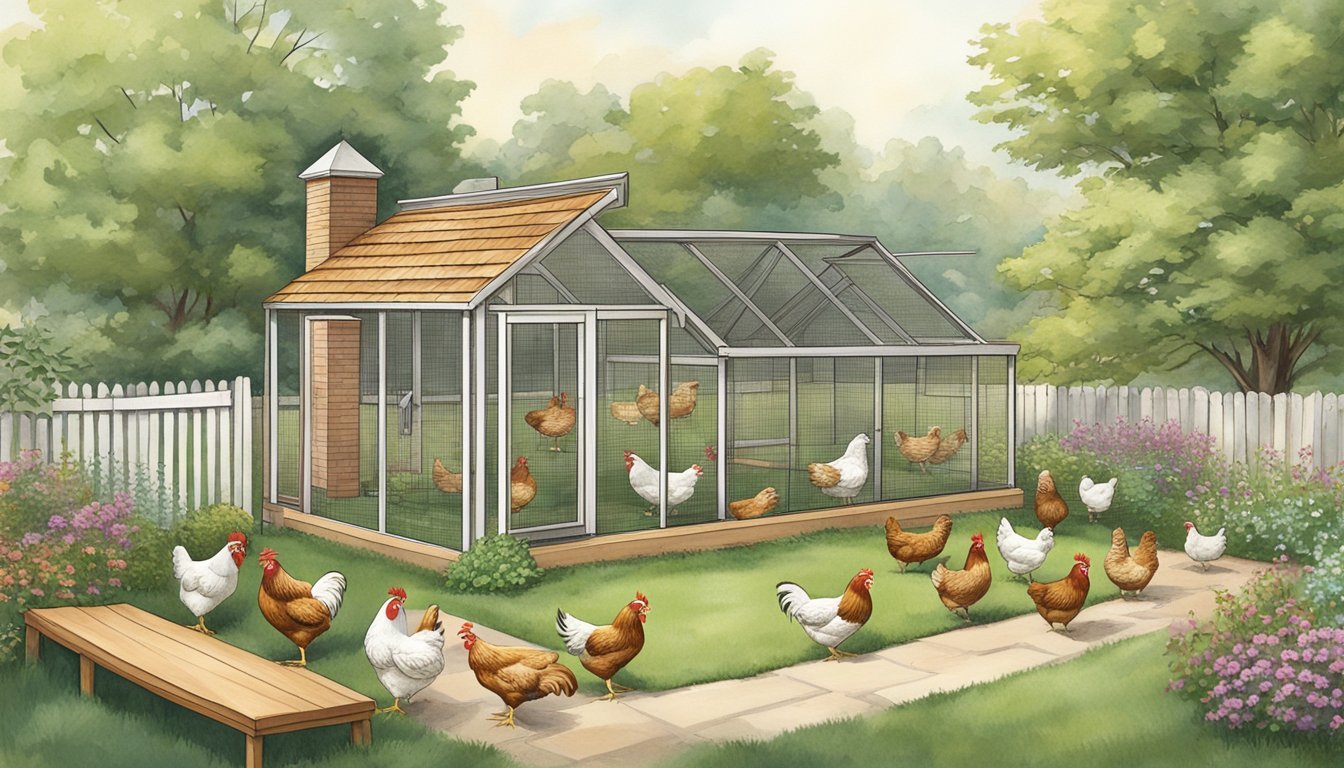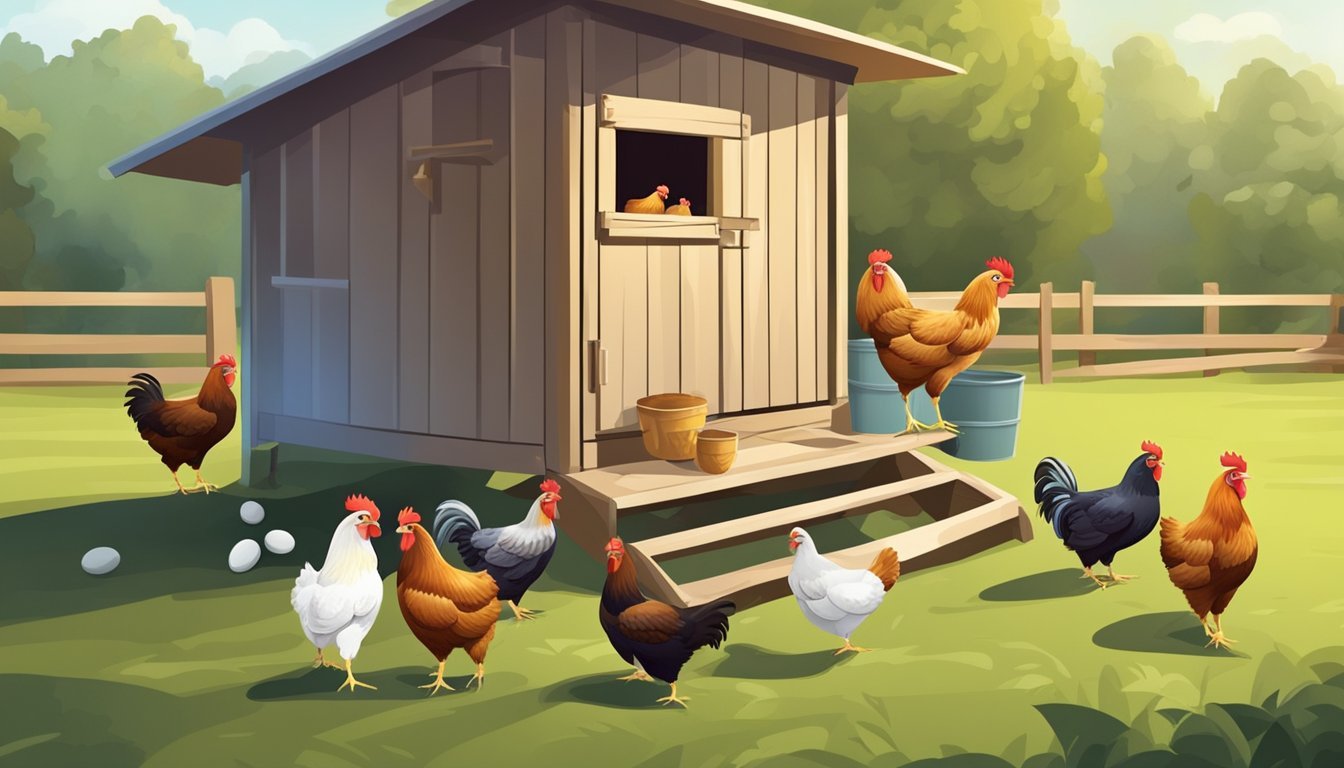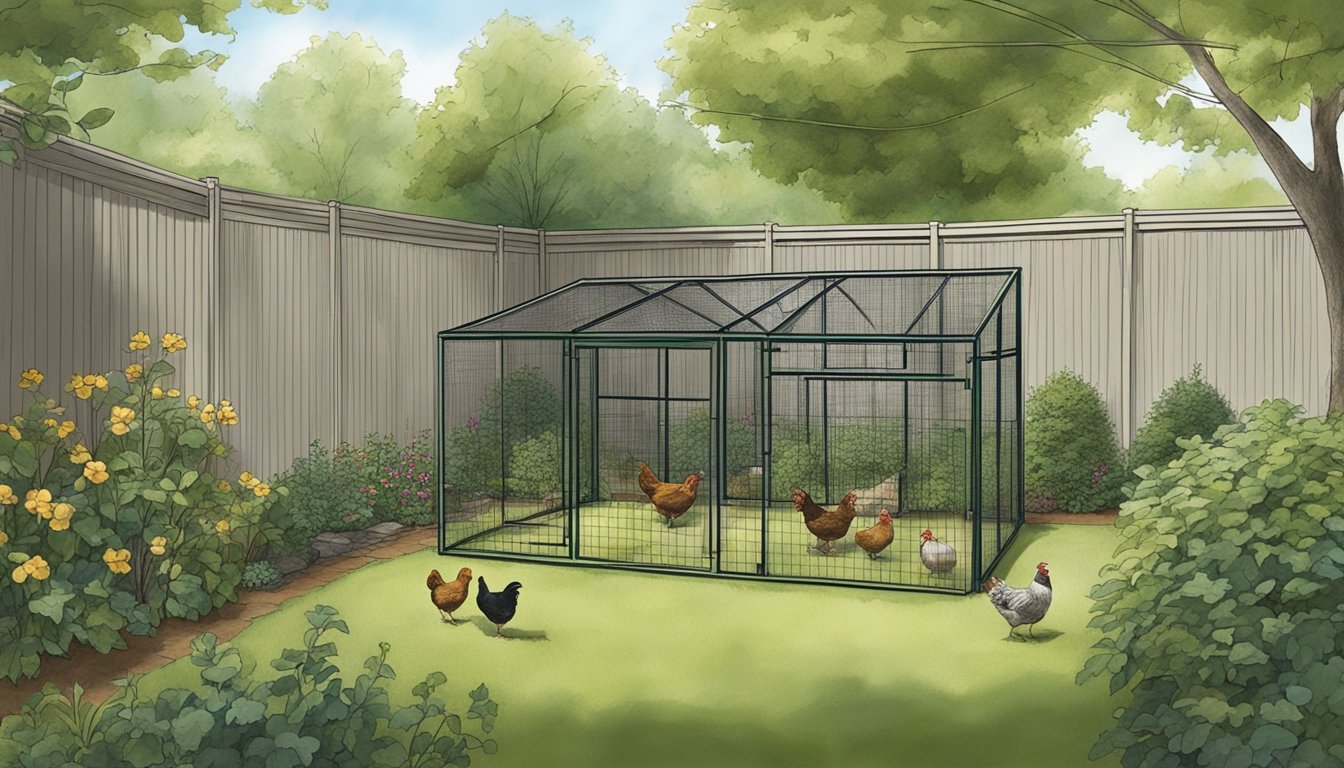Raising Backyard Chickens in Evanston, IL
Key Tips for Urban Poultry Farming
Raising backyard chickens in Evanston, Illinois, reflects an increasing interest in local food sources, sustainable living, and the joy of caring for these birds. In Evanston, residents interested in urban agriculture have specific guidelines to ensure the health and safety of their chickens, their neighborhood, and themselves. The local ordinance permits the keeping of 2 to 6 hens, providing fresh eggs for households and an educational experience for all ages. However, roosters are excluded to prevent noise disturbances.
Ensuring compliance with Evanston's backyard chicken regulations helps maintain harmony between human and animal residents. Chicken coops, or accessory structures, must be situated at least 10 feet from the owner's home, at least 3 feet from property lines, and they cannot exceed 14.5 feet in height. Moreover, the structures must occupy less than 40% of the rear yard space. Sanitation is crucial; the areas must be kept clean and must not attract flies, preserving neighborhood cleanliness and tranquility.
The city's efforts to support backyard chicken farming are also embodied by the Evanston Backyard Chickens Committee, an organization dedicated to educating residents about the benefits of raising chickens and advocating for fair and supportive laws. These regulations and community resources make Evanston a city that supports and manages urban chicken farming responsibly.
Understanding Local Chicken Laws in Evanston
Before starting a backyard chicken endeavor in Evanston, IL, it is crucial for residents to be aware of the specific city ordinances that regulate the keeping of chickens within city limits.
Evanston Chicken Ordinance Essentials
Evanston's local government enforces certain ordinances pertaining to the raising of backyard chickens. Key components of the chicken ordinance include:
Housing: Chickens must be kept in an 'accessory structure' such as a coop or henhouse.
Cleanliness: The area must be maintained to prevent odors and not attract flies.
Table 1: Basic Requirements
Requirement Details Number of Hens Allowed 2 to 6 hens Roosters Not permitted Rear Yard Coverage Coop cannot cover more than 40% of the yard Coop Height Must be less than 14.5 feet
Permits and Livestock Premises Registration
To legally keep backyard chickens, residents must navigate through a process of obtaining necessary permits and registrations:
Hen Coop Fee: A fee is required for hen coop licensure.
Registration: Registration with the Illinois Department of Agriculture Livestock Premises is mandatory.
Restrictions on Coop Location and Number of Chickens
There are specific spatial restrictions that regulate where the chicken coop can be located within one's property:
Minimum Distances: A coop must be at least 10 feet away from the owner's home and 3 feet from the property line.
Capacity: Regulations dictate 4 square feet per hen in the run area.
Table 2: Location and Space Requirements
Location Requirement Specification Coop from Owner’s Home Minimum 10 feet Coop from Property Line Minimum 3 feet Space per Hen Minimum 4 square feet (run area)
By adhering to these guidelines, residents of Evanston can ensure they are in compliance with local chicken laws, which are designed to balance the benefits of raising chickens with the need to maintain community standards and neighbor considerations.
Planning Your Chicken Coop
Before one starts building a chicken coop in Evanston, IL, they must carefully plan for its location, design, and material use, with a keen emphasis on providing sturdy shelter against various weather conditions.
Selecting the Right Location and Space
Space: In Evanston, IL, homeowners should allow 10 feet of distance from their home and position the coop at least 3 feet from the property line when planning the coop location. Additionally, the coop must consume less than 40% of the rear yard.
Sunlight & Drainage: A suitable spot for a chicken coop requires good drainage to prevent water accumulation and sufficient sunlight to ensure a warm and dry environment for the chickens.
Coop Design and Material Considerations
Size & Height: Ensure the coop dimensions comply with local ordinance, which restricts the height to less than 14.5 feet. The size should be proportionate to the number of chickens, offering enough space for them to live comfortably.
Materials: Use durable, predator-resistant materials that are easy to clean and maintain. Quality materials will not only extend the lifespan of the coop but also protect the chickens from elements and keep them healthy.
Ensuring Adequate Shelter from Weather
Orientation: The coop should be oriented to face away from prevailing winds. This provides better insulation and protection for the chickens during adverse weather.
Insulation: Proper insulation is crucial to shield chickens from Evanston's variable climate. Coops should be built to maintain a stable temperature inside, keeping chickens warm during the cold and cool during the heat.
Choosing Your Chickens
When raising backyard chickens in Evanston, Illinois, prospective poultry keepers must carefully consider breed selection, the combination of hens and roosters, and whether to start with chicks or mature birds.
Selecting Chicken Breeds for the Local Climate
Selecting the right chicken breeds that can tolerate Evanston's climate is paramount. Evanston experiences cold winters, so breeds with good cold tolerance are essential. Breeds like the Plymouth Rock, Rhode Island Red, and Orpington are known for their hardiness in colder weather. These breeds not only withstand the chill but also continue to lay eggs consistently.
Plymouth Rock: Hardy, friendly, and consistent egg layers.
Rhode Island Red: Robust, high egg production, good foragers.
Orpington: Fluffy feathering for extra cold protection, gentle temperament.
Deciding Between Hens, Roosters, or Both
Evanston's chicken ordinance permits up to six hens but prohibits roosters. This makes the decision straightforward for urban chicken enthusiasts: only hens are allowed. Hens are responsible for egg production and can lay eggs without a rooster present. It's also worth noting that hens typically exhibit less aggressive behavior and generate less noise than roosters, making them more suitable for a suburban setting.
Raising Chicks vs. Buying Mature Chickens
Prospective chicken keepers must decide between starting with young chicks or purchasing mature hens, commonly known as pullets. Raising chicks allows for a stronger bond and ensures they acclimate to their environment from a young age. However, it requires more initial effort and equipment, such as brooders and heat lamps. In contrast, pullets are a more immediate source of eggs and require less initial care. They are typically 16 to 20 weeks old and nearing the start of their egg-laying phase.
Raising Chicks: Time-intensive, requires extra care, but results in tamer birds.
Buying Pullets: Less laborious, quicker egg production, minimal initial setup.
Chicken Care Basics
When raising backyard chickens in Evanston, IL, it is crucial to provide proper feeding, maintain a clean environment, and monitor for diseases to ensure the health and well-being of the flock.
Feeding and Nutrition Tips
Chickens require a balanced diet to stay healthy. From 0-8 weeks, chicks should be given an 18-20% starter feed in crumble form to support their rapid growth. As they develop, from 8-14 weeks, their diet should shift to a 16-18% starter/grower feed. Once they reach 15-18 weeks, a 16% finisher feed is appropriate until they are ready to lay eggs. It's essential that their feed is kept dry and safe from contaminants.
0-8 Weeks: 18-20% Protein (Starter Crumbles)
8-14 Weeks: 16-18% Protein (Starter/Grower)
15-18 Weeks: 16% Protein (Finisher)
For adult chickens, a balanced layer feed is essential. Ideally, it should contain about 16% protein. Additionally, chickens need access to grit for digestion and oyster shell or similar for calcium, which is vital for eggshell production.
Health Monitoring and Disease Prevention
To prevent disease, regular health checks are crucial. Look for signs like changes in behavior, abnormal droppings, and irregular egg production. Good management includes vaccination against common poultry diseases and treating for parasites such as mites and lice. It's also important to eliminate standing water to prevent mosquito breeding and disease spread.
Health Checklist:
Behavioral Changes
Droppings Consistency
Egg Production
Visible Parasites
Cleaning and Maintaining the Coop
Coop cleanliness is vital to preventing disease and attracting pests. The coop should be cleaned regularly, with a thorough cleaning every few weeks. Bedding should be dry and replaced often. The coop design should allow for at least 10 feet of distance from human dwellings and 3 feet from property lines. The space must not exceed 14.5 feet in height and should cover no more than 40% of the rear yard. Proper waste management and sanitization reduce the risk of disease and pest infestations.
Cleaning Schedule:
Daily: Remove droppings and refresh water
Weekly: Clean feeders and check for signs of wear or damage
Monthly: Replace bedding and examine for structural integrity
Egg Production and Usage
In Evanston, IL, residents raising backyard chickens can expect a cycle of egg production that typically fluctuates with the hens' age but offers the advantage of fresh eggs. The following subsections provide an understanding of the egg-laying process, the benefits of obtaining fresh eggs directly from one’s backyard, and essential tips for collecting and storing these eggs safely and effectively.
Understanding the Egg-Laying Process
Backyard chickens usually begin laying eggs at about six months of age, and their productivity can last for several years, with peak production occurring in the first year. Egg production is influenced by factors such as breed, daylight exposure, and nutrition. A hen's laying cycle can be managed through proper lighting and diet to help maintain a steady supply of eggs.
Benefits of Fresh Eggs
Fresh eggs from backyard chickens in Evanston carry numerous benefits. They are known for their rich flavor and strong shells due to the chickens’ access to a varied diet and natural environment. They can also be more nutritious; fresh eggs collected straight from the coop may boast higher levels of vitamins and omega-3 fatty acids compared to store-bought eggs.
Tips for Collecting and Storing Eggs
Collecting eggs regularly is crucial; it should be done at least once a day. After collection, eggs require careful handling:
Cleaning: Wipe off any dirt with a dry cloth; avoid washing unless necessary, as it removes the protective bloom.
Storing: Place eggs in a refrigerator at 4°C (39°F) to maintain freshness.
Rotation: Use a first in, first out system, using the oldest eggs first.
By adhering to these practices, one promotes both the longevity of the eggs and the health of the backyard flock.
Community and Neighborhood Relations
Successfully raising backyard chickens in Evanston, IL requires good community and neighborhood relations. Maintaining open communication and addressing any issues promptly ensures a harmonious environment for both the chickens and the neighborhood.
Communicating with Neighbors About Your Chickens
It is essential for residents to engage in proactive dialogue with their neighbors when raising backyard chickens. Informing and reassuring neighbors about the care of chickens, explaining the benefits such as access to fresh eggs, and sharing plans for the coop's location and maintenance contribute to fostering neighborly goodwill.
Key points for communication:
Number of chickens allowed: Up to 6 hens (roosters are not permitted)
Coop placement: Must be 10 feet from the owner's residence and 3 feet from property lines
Coop size: Cannot cover more than 40% of the rear yard
Commitment to cleanliness and noise management
Addressing Potential Nuisance Issues
Residents must be meticulous in preventing and rectifying nuisance issues to maintain positive relations with their neighborhood. Ensuring coops are kept clean to avoid attracting flies and handling waste adequately is crucial. Noise must be managed as hens can sometimes be disruptive; providing enrichment and maintaining a regular feeding schedule can help minimize disruptive behaviors.
Steps to prevent nuisances:
Regular coop cleaning to minimize odors and pests
Proper waste disposal
Providing a well-structured environment for the chickens
Participating in Local Poultry Shows
Involvement in local poultry shows allows residents to engage with the broader community and showcases the pride of raising backyard chickens. They can share experiences, learn from fellow poultry enthusiasts, and highlight the care taken in raising healthy backyard chickens. Participation in these shows can strengthen community ties and promote understanding and interest in urban poultry keeping.
Benefits of show participation:
Education of the public about keeping backyard chickens
Sharing best practices and learning opportunities
Enhancing the community's perception of urban poultry keeping through demonstration of well-cared-for animals
Considerations Beyond Evanston
In exploring the practice of raising backyard chickens, it is imperative to understand the local ordinances specific to each area. The regulations in Evanston are not necessarily identical to those of neighboring regions in Illinois.
Comparing Evanston's Laws with Surrounding Areas
Evanston's laws provide for the keeping of up to six hens but no roosters, and require coops to be at least 10 feet from the owner's dwelling and 3 feet from property lines. To further illustrate, a comparative list of nearby areas and their poultry regulations include:
Skokie: Adjacent to Evanston, has its own set of regulations regarding the raising of backyard chickens.
Chicago: Allows for the keeping of poultry with conditions similar to Evanston, focusing on maintaining proper sanitation and not causing a nuisance.
Joliet: Permits chickens and ducks with specific regulations on the number and type of fowl.
Aurora: Also has regulations regarding the number of chickens allowed and the location of coops relative to property lines and neighboring homes.
Raising Chickens in Other Parts of Illinois
Across Illinois, there is a variation in backyard poultry laws from town to town:
Des Plaines: Currently allows up to four hens, with potential changes to allow more poultry and include roosters.
Naperville, Elgin, Schaumburg, Woodridge: Each of these towns has their own specific codes regarding the raising of poultry that differentiates from Evanston's ordinance.
Northbrook, Arlington Heights, Glenview, Wheeling: Residents considering backyard chickens must consult local laws as they might differ in terms of restrictions and permit requirements compared to Evanston.
Not listed municipalities such as Hinsdale, Westmont, Oak Brook, and others in Cook County and the state of Illinois may have unique restrictions or permit requirements for backyard chickens. It is crucial for residents in each locality to review their specific city codes and state laws regarding the keeping of poultry to ensure compliance.







